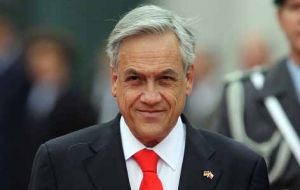MercoPress. South Atlantic News Agency
Chile announces plan to improve living conditions of the indigenous Mapuche peoples
 Piñera pledged “an atmosphere of peace for the economic and social development of Araucanía”
Piñera pledged “an atmosphere of peace for the economic and social development of Araucanía” In a special cabinet meeting last Friday, Chilean President Sebastián Piñera proposed a series of measures aimed at improving infrastructure and human investment in the south-central Araucanía region.
The so-called “Plan Araucanía” follows two weeks of mounting tension between the Chilean government and indigenous Mapuche peoples, for which the Piñera administration attracted strong national and international criticism.
Piñera said the plan will create “an atmosphere of peace for the economic and social development of Araucanía.”
Piñera’s plan, to be implemented over the next 30 days, will seek to build new schools and hospitals around the region, as well as financially helping victims of the recent violence. In particular, the summit discussed the creation of a new academy for high-achieving pupils in Ercilla, with education to be focused around a multicultural curriculum.
The region of Araucanía is demographically 25% Mapuche -making it the region with the highest concentration of indigenous inhabitants in Chile - and suffers from waves of sporadic violence, which have intensified in recent months. Centuries-old land disputes between Mapuches and private landowners have resulted in violent clashes between indigenous protesters and police. While Mapuches call for greater autonomy, accusing the authorities of repression and cultural discrimination, police have in turn accused Mapuche protesters of questionable tactics, such as using children as “human shields.”
In the run-up to the meeting, several Chilean government officials travelled to Araucanía to meet with Mapuche activist leaders and Interior Minister Rodrigo Hinzpeter met with congressmen from the area.
Mapuche activists have been highly critical of the government’s previous actions, with one senior activist, Víctor Queipul, accusing Piñera of trying to “provoke us, without trying to find a way to solve the issue through dialogue”.
Chilean NGOs and the opposition Concertación coalition have also called on the government to step up its efforts in dealing with the Mapuche conflict. In particular, Senator Jaime Quintana, president of the liberal Party for Democracy (PPD), criticized an increased police deployment in the region as “inappropriate” and “lacking context”.
The spokesperson for the Mapuche Land Alliance, Meulen Huenchu, was critical of the Araucanía Plan, branding it a “circus” that fails to adequately factor in the human rights demands of the Mapuches themselves.
“They are unwilling to maintain a dialogue with us,” said Huenchu. “This means that they will continue their total silence over the violence that is happening today in these communities”.
However, following the Social Summit, Senator Alberto Espina of the conservative National Renovation Party— part of Piñera’s governing coalition— praised the efforts made by Piñera’s administration.
Espina argued that “this government is the first to grab the bull by its horns and try to revert this situation”.
By Miles Coleman - The Santiago Times




Top Comments
Disclaimer & comment rulesCommenting for this story is now closed.
If you have a Facebook account, become a fan and comment on our Facebook Page!